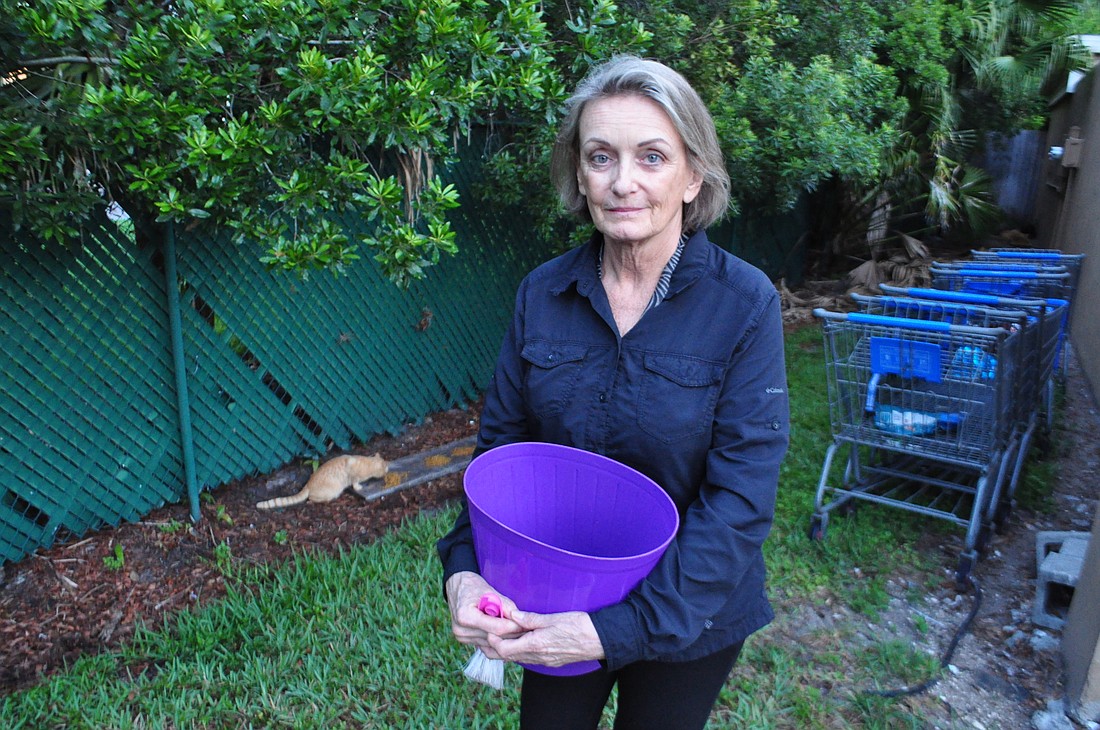- May 4, 2024
-
-
Loading

Loading

EAST COUNTY — Barb Miller starts her days before sunrise by feeding her cats — all 50 or so of them.
Well, they aren’t her cats exactly, although she has names for more than half of the residents of the seven feral cat colonies she feeds along State Road 64 in the morning and the handful of other cat colonies along University Parkway she visits at night.
During her visits, the 68-year-old Lakewood Ranch resident grabs buckets of cat kibble from the trunk of her car, walks to the cats’ eating areas and pours food for their nourishment. She rarely, if ever talks, so as not to disrupt their normal routines. A few of them walk toward her, eager for a morning back rub.
“I never talk when I go to feed them. I use my hands,” Miller said. “I’m all business.”
But Miller is worried about one cat colony she cares for: a group of approximately 20 cats behind Eden Pointe Apartments.
The apartment complex’s management has said it is going to have the cats removed. Miller begged for time to relocate the cats at no cost to the complex, and management agreed, although she doesn’t know exactly how much time she has.
Miller fears for the worst if the cats are relocated.
“This is not easy,” Miller said. “This is going to be almost impossible.”
Eden Pointe Apartments did not return a message for comment by press time.
Meanwhile, Miller is searching for solutions.
She has started searching for agricultural land to purchase, where she could place feral cat colonies.
The property would have to be fenced and have a barn that is usable as a feral cat sanctuary.
She is also looking at other programs that have relocated feral cats to farms where they can serve as barn cats. The new owners would have to keep the cats in an enclosed area for about three weeks and feed them high quality food to make the cats want to stay at the barn.
Her third idea is to ask the complex to allow her to have all the animals spayed or neutered and set up a formal feral cat colony in woods behind the complex. She said she can’t just relocate the animals into another colony because cats are territorial.
But she doesn’t see that as a permanent solution, at least for the apartment complex.
“It’s only a matter of time before a new group of cats comes in,” she said. “People move in with cats and move out without them. It’s socioeconomics.”
A way of life
Miller’s passion for feral cats began when she was a child.
“My parents did this,” she said. “I grew up in New York City in a five-story walk-up building. My dad was always sending me to the cellar with food for the cats.”
After moving to Florida in 1997, she volunteered with rescue groups, but recognized a greater need to care for the area’s feral cat colonies. At each spot, she tries to trap the injured ones and pays for their veterinary bills out of pocket. She also traps them to have them spayed or neutered, or if she identifies a cat that seems adoptable.
The cats Miller looks after are all feral, although she’s confident some may have once been house cats left by owners who were moving away. Each feral colony has a mix of breeds, some including Siamese and Himalayan cats, for example.
“My goal is to spay and neuter as many cats in the wild as I can, and no cat goes hungry if I can help it,” Miller said. “Sometimes, cats aren’t feral. People dump their pets. These are the ones I get out of there.”
Caring for the uncared for is a way of life for Miller. She stores a leash in a car in case she finds a loose dog, but focuses on the feral cat population that’s less visible. She also keeps McDonald’s gift cards in her car to give to homeless people she meets and brings them coats in the winter and packages of food.
Miller says cats aren’t as self-sufficient as people believe. Many of the cats she tends to have been declawed and cannot catch their own food.
Businesses that cats relocate behind often have rat traps and other deterrents for vermin on which the cats normally would thrive, so there is not enough vermin for all the cats to survive.
Meanwhile, Miller knows why she devotes her mornings and evenings to the cat colonies.
“I know there are certain creatures out there who go to bed with a full belly (because of what I’m doing),” Miller said. “God’s been good to me. I’m just paying him back.”